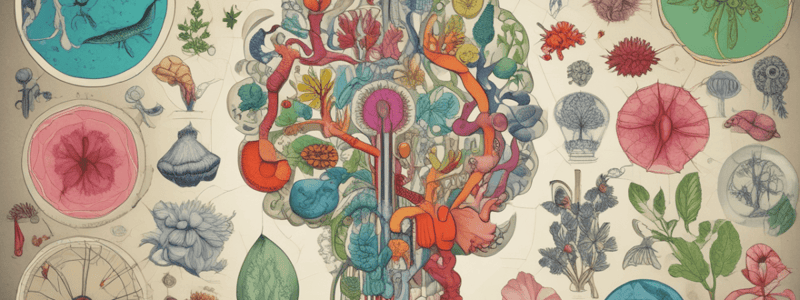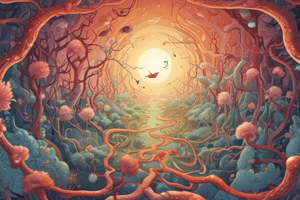Podcast
Questions and Answers
What is the primary focus of the scientific study of biology?
What is the primary focus of the scientific study of biology?
- The structure and function of microorganisms
- The evolution of species over time
- The study of life and living organisms (correct)
- The chemical processes that occur within living organisms
Which branch of biology is concerned with the study of plants?
Which branch of biology is concerned with the study of plants?
- Zoology
- Ecology
- Botany (correct)
- Microbiology
What is the basic structural and functional unit of life?
What is the basic structural and functional unit of life?
- Molecule
- Tissue
- Cell (correct)
- Organ
What is the process by which plants convert light energy into chemical energy?
What is the process by which plants convert light energy into chemical energy?
What is the level of organization that refers to a group of organs that work together to perform a specific function?
What is the level of organization that refers to a group of organs that work together to perform a specific function?
Which biological process is responsible for maintaining a stable internal environment despite changes in the external environment?
Which biological process is responsible for maintaining a stable internal environment despite changes in the external environment?
What is the level of organization that refers to a group of different species that live in a specific area?
What is the level of organization that refers to a group of different species that live in a specific area?
What is the process of cell division that results in four non-identical daughter cells?
What is the process of cell division that results in four non-identical daughter cells?
What was the original name of Google when it was founded in 1998?
What was the original name of Google when it was founded in 1998?
What is the name of Google's platform for businesses to create and display ads?
What is the name of Google's platform for businesses to create and display ads?
What is the name of Google's cloud-based storage service?
What is the name of Google's cloud-based storage service?
What is the name of Google's open-source mobile operating system?
What is the name of Google's open-source mobile operating system?
What is the name of Google's algorithm used to rank websites in search results?
What is the name of Google's algorithm used to rank websites in search results?
What is the name of the video-sharing platform acquired by Google in 2006?
What is the name of the video-sharing platform acquired by Google in 2006?
Flashcards are hidden until you start studying
Study Notes
Definition and Scope
- Biology is the scientific study of life and living organisms
- It encompasses the structure, function, growth, evolution, distribution, and taxonomy of all living things
Branches of Biology
- Botany: study of plants
- Zoology: study of animals
- Microbiology: study of microorganisms such as bacteria and viruses
- Ecology: study of the interactions between organisms and their environment
- Biochemistry: study of the chemical processes that occur within living organisms
- Molecular Biology: study of the structure and function of biological molecules such as DNA and proteins
- Genetics: study of heredity and variation
- Evolutionary Biology: study of the evolution of species over time
Levels of Organization
- Molecule: basic building blocks of life (e.g. DNA, proteins, carbohydrates)
- Cell: basic structural and functional unit of life
- Tissue: group of similar cells that perform a specific function
- Organ: structure composed of two or more types of tissues that perform a specific function
- Organ System: group of organs that work together to perform a specific function
- Organism: individual living thing (e.g. plant, animal, fungus)
- Population: group of organisms of the same species that live in a specific area
- Community: group of different species that live in a specific area
- Ecosystem: community of organisms and their environment
- Biosphere: all of the ecosystems on Earth
Biological Processes
- Photosynthesis: process by which plants convert light energy into chemical energy
- Respiration: process by which cells convert glucose into energy
- Mitosis: process of cell division that results in two identical daughter cells
- Meiosis: process of cell division that results in four non-identical daughter cells (gametes)
- Homeostasis: ability of an organism to maintain a stable internal environment despite changes in the external environment
Biological Molecules
- Carbohydrates: energy-rich molecules (e.g. sugars, starches)
- Proteins: molecules composed of amino acids that perform a variety of functions (e.g. enzymes, hormones, structural components)
- Nucleic Acids: molecules that contain genetic information (e.g. DNA, RNA)
- Lipids: molecules that perform a variety of functions (e.g. energy storage, cell membrane structure)
- ATP (Adenosine Triphosphate): molecule that provides energy for cellular processes
Definition and Scope of Biology
- Biology is the scientific study of life and living organisms, covering their structure, function, growth, evolution, distribution, and taxonomy.
Branches of Biology
- Botany studies plants, while Zoology focuses on animals.
- Microbiology explores microorganisms like bacteria and viruses.
- Ecology examines the interactions between organisms and their environment.
- Biochemistry delves into the chemical processes within living organisms.
- Molecular Biology investigates the structure and function of biological molecules like DNA and proteins.
- Genetics explores heredity and variation, while Evolutionary Biology examines the evolution of species over time.
Levels of Organization
- Molecules, such as DNA and proteins, are the basic building blocks of life.
- Cells are the basic structural and functional units of life.
- Tissues consist of groups of similar cells performing specific functions.
- Organs are composed of two or more types of tissues performing specific functions.
- Organ Systems comprise groups of organs working together to perform specific functions.
- Organisms are individual living things, such as plants, animals, or fungi.
- Populations consist of groups of organisms of the same species living in a specific area.
- Communities comprise groups of different species living in a specific area.
- Ecosystems consist of communities of organisms and their environment.
- The Biosphere encompasses all ecosystems on Earth.
Biological Processes
- Photosynthesis is the process by which plants convert light energy into chemical energy.
- Respiration is the process by which cells convert glucose into energy.
- Mitosis is the process of cell division resulting in two identical daughter cells.
- Meiosis is the process of cell division resulting in four non-identical daughter cells (gametes).
- Homeostasis is the ability of an organism to maintain a stable internal environment despite external changes.
Biological Molecules
- Carbohydrates are energy-rich molecules, such as sugars and starches.
- Proteins are composed of amino acids and perform various functions, including enzymes, hormones, and structural components.
- Nucleic Acids, like DNA and RNA, contain genetic information.
- Lipids perform various functions, including energy storage and cell membrane structure.
- ATP (Adenosine Triphosphate) provides energy for cellular processes.
History of Google
- Founded in 1998 by Larry Page and Sergey Brin, initially named "Backrub" and later renamed to Google, inspired by the word "googol"
- First office was set up in a friend's garage in Menlo Park, California
Products and Services
- Search Engine: allows users to search the internet for information
- Advertising: Google AdWords platform for businesses to create and display ads
- Email: Gmail, a free, web-based email service
- Cloud Storage: Google Drive, a cloud-based storage service
- Productivity Suite: Google Workspace (formerly G Suite), includes Google Docs, Sheets, and Slides
- Android: an open-source mobile operating system
- YouTube: a video-sharing platform acquired by Google in 2006
- Maps: a mapping service providing directions, street views, and location-based information
Key Features and Innovations
- PageRank Algorithm: a link analysis algorithm used to rank websites in search results
- Google Instant: provides instant search results as users type
- Autocomplete: predicts and completes search queries
- Knowledge Graph: a knowledge base that provides information about entities, people, and places
Acquisitions and Milestones
- Acquired YouTube in 2006, Waze in 2013, and Nest in 2014
- Reached 1 billion active users in 2012, launched Google+ in 2011
Studying That Suits You
Use AI to generate personalized quizzes and flashcards to suit your learning preferences.




